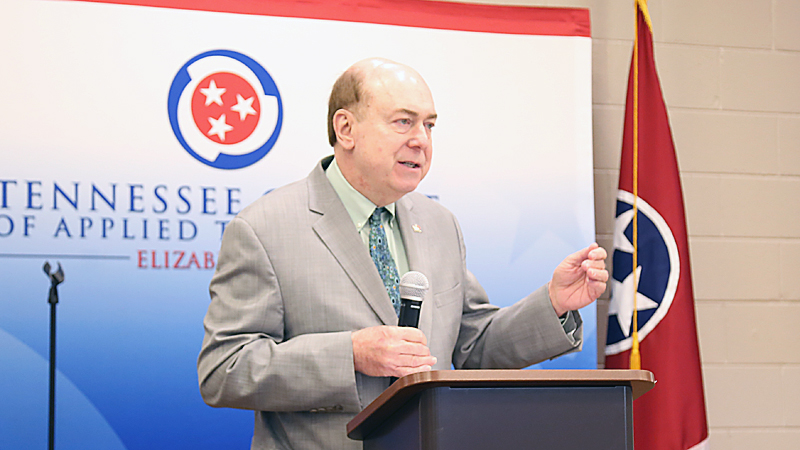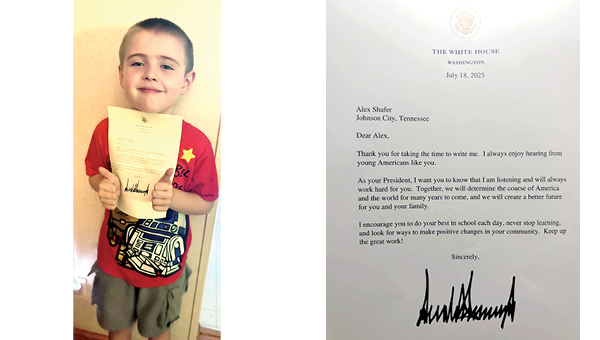TN Treasurer visits Elizabethton to launch financial literacy program
Published 3:47 pm Monday, July 30, 2018

- Star Photo/Abby Morris-Frye Tennessee Treasurer David Lillard visited Elizabethton Monday morning to kick off a new state-wide program available to teachers to help improve the financial literacy of their students.
Local educators took part in a special training session on Monday as Tennessee Treasurer David Lillard visited Elizabethton to celebrate the state-wide launch of a curriculum designed to help students be better prepared for their financial future.
Lillard, State Rep. John Holsclaw, and staff members of the Tennessee Financial Literacy Commission, of which Lillard serves as chairman, hosted Monday’s training session for My Classroom Economy. The program has already been in place in select schools as pilot programs and Monday marked the official state-wide launch of the curriculum.
Trending
The Tennessee Financial Literacy Commission is an initiative through the Tennessee Treasurer’s Office designed to help give Tennesseans the tools they need and access to resources to help them make sound financial decisions. My Classroom Economy is the newest of three programs through the TFLC geared toward school-age children.
East Side Elementary is one of the schools which has already implemented the My Classroom Economy program. Christie Malone, a teacher at East Side and a Board member for TFLC, spoke briefly to those attending Monday’s training session.
“It’s been a goal of mine to see these programs implemented and used in our classrooms,” Malone said.
According to Lillard and his staff, My Classroom Economy is a unique and innovative program designed to teach children financial responsibility through a fun, experience-based learning approach.
“It is truly an interactive roleplaying situation,” Lillard said.
Through the program, each classroom sets up their own mini-economy where the children take on different roles such as merchants, bankers, and other professions to learn about earning and spending money. Students will also learn about evaluating expenses from a needs versus wants perspective, as well as financial topics such as loans, interest, and inflation.
Trending
“Everybody is playing these roles, and you earn money for good works,” Lillard explained.
In the classrooms where the program has already been tested, Lillard said teachers reported not only an increased financial literacy for students but improved behavior as well.
Helping children develop tools for financial stability at an early age is essential, according to Lillard.
“It’s a matter of training people early in life,” Lillard said, adding the new program places emphasis on students in K-8 grades. “We are trying to effect a generational shift in how Tennesseans think about finances.”
One of the reasons the TFLC is focusing on the younger student and offer these educational programs can be seen when you look at the statistics, Lillard said.
While Tennessee’s state government ranks high for financial stability with low debt and balanced budgets, Lillard said the state also ranks high in another rating, but this one stands out in stark contrast.
“Tennessee is one of the highest per capita rates for personal bankruptcy in the nation,” Lillard said. “That is not a good statistic. We intend to try to change that.”
Tennessee is one of 17 states that require high schools to provide a personal finance class, but Lillard said he and others fear that may be too late to start children on the path to financial stability.
“If you don’t have a good financial literacy base, your chances of completing high school and going on to a post-secondary education are very, very small, and you will be sentenced to a life of minimum wage,” Lillard said.
Since the legislation creating the Tennessee Financial Literacy Commission passed through the legislature in 2010, Lillard said he and staff at the TFLC had been hard at work developing the curriculum for school children as well developing resources for adults to help them make more sound financial decisions. Lillard praised the Tennessee General Assembly — notably State Rep. John Holsclaw and State Sen. Rusty Crowe — for their support of the TFLC and its work.
“We are fortunate to have their leadership,” Lillard said.
Holsclaw was on hand Monday morning to speak with teachers and voice his support for the TFLC and its programs.
“This is a critical life skill, financial literacy,” Holsclaw said. “To me, it is like reading. It is one of those basic skills children need to be successful.”
“If you want to make an impact or a change, you don’t start with adults, you start with children,” Holsclaw added. “That is why it is so critical to start financial literacy when they are young. We are the first state in the nation to implement this across the state.”
With the official state-wide launch, My Classroom Economy will now join the TFLC’s two other school financial curriculum programs in availability for all teachers and school systems in Tennessee. The other two programs are Financial Fitness for Life and Vault.
For more information on the Tennessee Financial Literacy Commission or the programs and resources it provides, visit the TFLC website at http://treasury.state.tn.us/FinLit.





